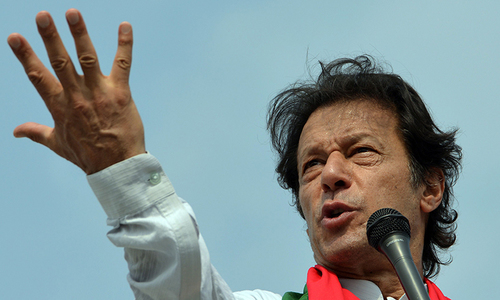ISLAMABAD: The Pakistan Tehreek-i-Insaf (PTI) has approached the Islamabad High Court (IHC) to challenge the Election Commission of Pakistan (ECP)’s decision to reject its applications against an audit of the party’s foreign funding.
Through a petition filed in the IHC on Thursday, the ruling party has requested the court to restrain the scrutiny committee formed by the Commission from probing the party’s foreign funding.
On Oct 10 a three-member bench of the ECP, headed by Chief Election Commissioner (CEC) retired Justice Sardar Mohammad Raza, had rejected four applications filed by the PTI against the audit of its accounts by the scrutiny committee and directed the panel to continue its work and submit a report as soon as possible.
Akbar S. Babar, a founding member of the PTI, had filed the case in 2014, alleging that the party had illegally collected about $3 million through two offshore companies, and that the money was sent through illegal channels from the Middle East to certain accounts of “PTI employees”.
He also alleged that the foreign accounts used to collect the funds were not mentioned in the annual audit reports submitted to the ECP by the PTI.
The party, in one of its petitions, took the plea that since the ECP which comprised the CEC and four members, was incomplete, an order passed by it lacked legal force.
The scrutiny committee was formed last year to investigate the issue of foreign funding of the PTI in a month, but later the time-limit was extended to an indefinite period.
During the hearing on Oct 1, a conversation took place between the CEC and the PTI’s counsel over the disclosure that the party was operating numerous undeclared accounts.
The party’s lawyer argued that some of the PTI’s accounts might not be in the knowledge of the party’s central office and that the PTI could not be held responsible for its account in Azad Kashmir as it fell under another legal jurisdiction.
On Aug 22, President Arif Alvi had appointed Khalid Mehmood Siddiqui from Sindh and Munir Ahmed Kakar from Balochistan as ECP members on the posts that had fallen vacant after the departure of Abdul Ghaffar Soomro and retired Justice Shakeel Baloch.
However, the ECP chief refused to administer oath to the new members on the ground that the appointments had been made without fulfilling constitutional requirements.
The ECP’s scrutiny committee is headed by the director general law and also comprises two auditors from the defence establishment.
The ECP was of the view that President Alvi had made these appointments “in violation of clauses 2A and 2B of Article 213 of the Constitution” that made it mandatory for these appointments to be made with the consensus of the prime minister and the Leader of the Opposition.
However, the committee could not make any significant progress as the PTI did not submit financial documents, particularly statements of its bank accounts, sought by the committee.
Published in Dawn, November 8th, 2019














































